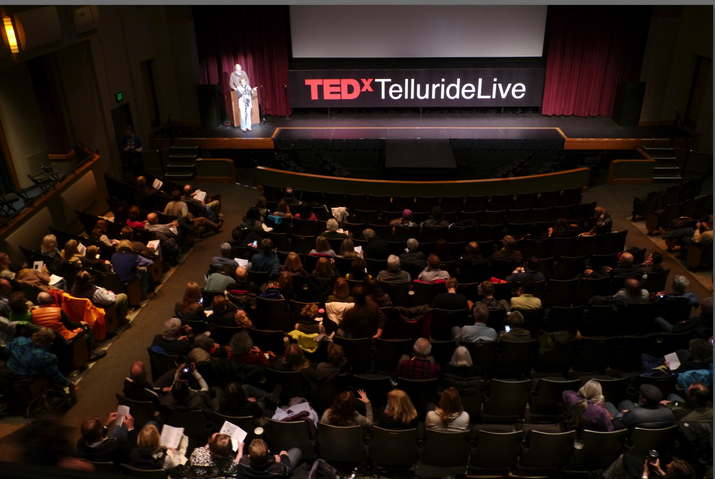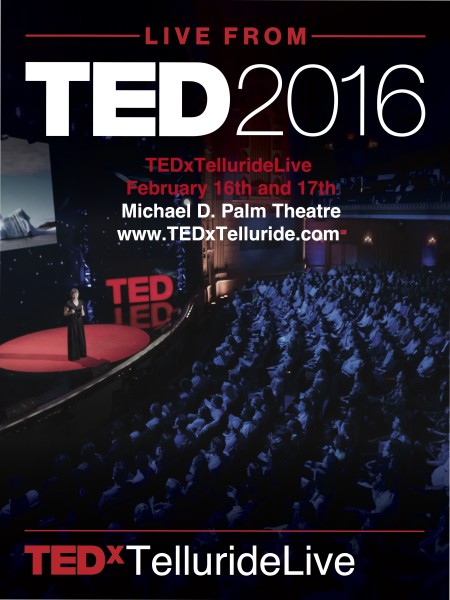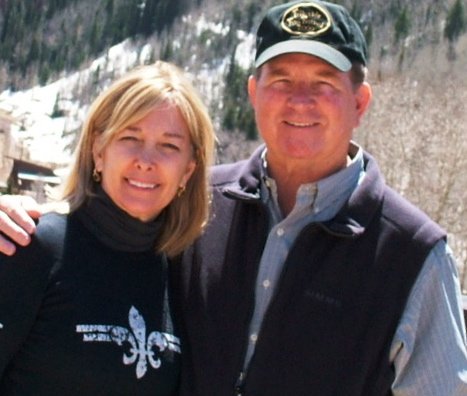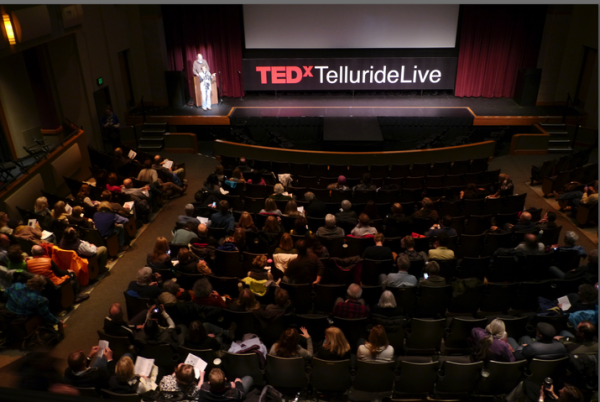
07 Feb TEDxTellurideLive: Dream, 2/16 & 2/17
Register to TEDxTellurideLive here.
“Dare to Dream big dreams; only big dreams have the power to move men’s souls,” Marcus Aurelius.

Don Quixote (in Tony-winning Broadway 1965 smash ‘Man from La Mancha”) set the famous Roman emperor/philosopher’s idea to music.
Is dreaming the impossible dream the only sure path to an unreachable star?
Likely a boldfaced, all caps YES.
Dreaming big is the secret of self-made millionaires and visionaries Dreaming big established the superstructure of iconic companies and movements such as Apple, Tesla, Microsoft, Amazon, Uber, Facebook, Virgin, Airbnb, and yes, Civil Rights with Martin Luther King. (Ok, so not all dreams come true. At least not yet.)
They all began with a dream of something wonderful and different from the status quo. The now legendary founders saw no limits, no boundaries when they looked at what they could be, have, or do in life.
Now imagine it’s you who has all the time, money, education, experience, contacts, resources, and anything and everything else you might need to grab and hold onto the brass ring. If your potential were completely unlimited, what kind of a life would you want to create for yourself, your family, your global neighbors?
The conference theme of TED2016 is “Dream”:
“Because dreams matter more than ever. Humanity has more capability, connection and possibility than ever in history. And yet too often we waste these powers. We get bogged down in the mundane. Confused by the complexity. Or exhausted by the naysayers.
“It’s time to resurrect the spirit of John Kennedy’s great moonshot challenge of the 1960s. This will be a conference dedicated to great feats of imagineering, invention, innovation … and the courageous dreamers who can bring us with them on their journey. It will be a week to stare hard at humanity’s toughest challenges, and to listen carefully to those who can show us a way forward. A week to celebrate the proven creative brilliance of our generation’s best artists, designers and story-tellers. A week to stir the blood.,” explains TED.
Dreaming about attending even part of the world-famous TED conference? Look no further than Telluride’s Palm Theatre, where on Tuesday, February 16 and Wednesday, February 17, the Formbys host TEDxTellurideLive.

Katrine & Bill Formby, founders, TEDxTellurideLive.
Register here: www.TEDxTellurideLive.com or TEDxTellurideLive@gmail.com. The list of game-changers includes Al Gore.
Full list of TEDx 2016 speakers and session schedules on 2/16/16 & 2/17/16 below:
Tuesday, Feb. 16, 9:30 – 11:15 am (Mountain Time)
Adam Savage, the host of “MythBusters” on the Discovery Channel, is a longtime special-effects artist and a minor obsessive.
Cédric Villani tackles perplexing problems in mathematical physics, analysis and geometry with rigor, wit and a signature personal style.
Haley Van Dyck is recruiting world-class technology talent into the US Federal Government to transform the way America delivers critical services for everyday people.
So Percussion is building a new canon of modern avant-garde percussion music, Their pieces range from hypnotic to cacophonic,
Joe Gebbia is a designer, entrepreneur, and the co-founder and Chief Product Officer of Airbnb. He helped redesign the way the world travels and people connect.
Travis Kalanick, Uber’s founder and CEO, is not only disrupting an entrenched industry but also reinventing urban transportation as we know it.
Tuesday, Feb. 16, 12:00 – 1:45 pm (Mountain Time)
Wanda Diaz Merced has developed a way to represent complex data about our universe as sound while searching for ways to study stellar radiation without relying on sight.
Holly Cohen, occupational therapist, adapts toys and other consumer electronics to create accessibility for all, including people with disabilities.
Dr. Mae Jemison, astronaut, physician, and engineer, is paving the way for human interstellar travel.
Joseph Ravenell delivers basic health care information to an at-risk demographic — African-American men using unexpected channels like the pulpit and the barber’s chair.
Ameera Ahmad leads journalists to the harrowing (and often hidden) stories of the Gaza Strip that they couldn’t find on their own.
Franz Freudenthal, pediatric cardiologist, saves children from congenital heart defects with his unique inventions.
Blitz the Ambassador infuses Brooklyn hip-hop style with the infectious polyrhythms of Afrobeat and highlife.
Tuesday, Feb. 16, 3:15 – 5:00 pm (Mountain Time)
Tim Urban, blogger and cartoonist, demonstrates that complex and long-form writing can stand out in an online wilderness choked with listicles and clickbait.
Adam Grant, organizational psychologist, discovered a powerful and often overlooked motivator: helping others.
Brian Little, Cambridge professor, analyzes and redefines the threads of our personalities — and suggests ways we can transform ourselves.
John McWhorter, linguist, thinks about language in relation to race, politics and our shared cultural history.
Noah Zandan, data scientist, uses data science to illuminate hidden (and often unconscious) messages in our communications — and suggests ways that speakers might heighten their impact.
Kio Stark, author of “When Strangers Meet,” explores the myriad ways encounters with strangers impact our lives.
Tuesday, Feb. 16, 6:00 – 7:45 pm (Mountain Time)
Norman Lear, writer, producer and free-speech champion, defined decades of U.S. popular culture with his groundbreaking TV shows.
Moran Cerf, ex-hacker, studies the underlying mechanisms of our psychology, by eavesdropping on the activity of our brain from the inside out.
Kenneth Lacovara, paleontologist who studies dinosaurs, blends exploration with the latest imaging and modeling techniques from engineering to medicine.
Silk Road Ensemble spins unique sounds that celebrate cultural solidarity.
Sarah Parcak, like a modern-day Indiana Jones, uses satellite images to locate lost ancient sites. The winner of the 2016 TED Prize, her wish will help protect the world’s cultural heritage.
Wednesday, Feb. 17, 9:30 – 11:15 am (Mountain Time)
Linus Torvalds, software engineer, shared the Linux kernel with a few computer hobbyists in 1991. The operating system they built reshaped the software industry.
Reshma Saujani, education activist, through her nonprofit Girls Who Code, initiates young women into the tech world. Her goal: one million women in computer science by 2020.
Mary Norris (“comma queen” ) copy editor for the New Yorker, Mary Norris enforces some of the most authoritative (some might say eccentric) style rules in publishing.
R. Luke DuBois, artist, composer, and engineer, weaves information from a multitude of sources into art and music exploring the tensions between algorithms, portraiture, and temporal space.
Amit Sood, director of Google’s Cultural Institute and Art Project, leads the effort to bring cultural artifacts from museums, archives and foundations onto the web in vivid, lifelike detail.
Raffaello D’Andrea, autonomous systems pioneer, explores the possibilities of autonomous technology by collaborating with artists, engineers and entrepreneurs.
Wednesday, Feb. 17, 12:00 – 1:45 pm (Mountain Time)
Parag Khanna, global strategist, foresees a world in which megacities, supply chains and connective technologies redraw the map away from states and borders.
Afshan Khan, UNICEF’s global relief mobilizer, helps children in crisis in every corner of the globe.
Dalia Mogahed is an author, advisor and consultant who studies Muslim communities.
Hugh Evans, humanitarian, has created an online community of millions of people (Global Citizen Platform) — all driven to eradicate extreme poverty by the year 2030.
Christiana Figueres is the executive secretary of the United Nations Framework Convention on Climate Change (UNFCCC), who led the recent COP 21 climate talks in Paris.
Wednesday, Feb. 17 3:15 – 5:00 pm (Mountain Time)
TED UNIVERSITY – THREE-T- FIVE MINUTE TALKS FROM ATTENDEES WHO HAVE “WOWED” THE TED CURATORS WITH A BRILLIANT PRESENTATION
Brian Kelly is the founder of ThePointsGuy, all about the art of maximizing travel experiences while minimizing spending.
Jonathan Bell is the founder of WANT, a consultancy, and a branding expert who has created over 150 company names and the identities of over 400 products and services.
Rachel Pritzker, philanthropist, wants to address “the world’s most wicked problems.”
Jason Pontin is the editor-in-chief and publisher of MIT Technology Review.
Anthony Goldbloom is the co-founder and CEO of Kaggle, a platform that crowdsources machine learning problems.
Dave Troy, the he co-host of TEDxMidAtlantic, is a serial entrepreneur and a data-viz fan.
Joshua Roman, a TED Fellow, is an independent-minded cellist.
Joanna Bloor co-founded and leads The Amplify Lab, which she describes as an “accelerator for people.”
Mark Goffman is a producer of Sleepy Hollow and West Wing and has an extraordinary family story of his own.
Nalini Nadkarn, called “the queen of canopy research,” explores the rich, vital world found in the tops of trees. She communicates what she finds to non- scientists, with the help of poets, preachers, and prisoners.
Esther Wojcicki is a journalism teacher and the founder of the Palo Alto High School Media Arts Program.
ShaoLan Hsueh has been a tech writer, an investor and entrepreneur, who now focuses on teaching Chinese through an engaging new method.
Tom Hulme is a general partner at Google’s GV venture fund.
Peter J. Toren, intellectual property litigator whose family has recovered a famous painting stolen by the Nazis.
Özge Yilmaz’s wedding to her husband, Cagri, was an opportunity to raise money for a Turkish foundation supporting orphan kids.
Wednesday, Feb. 17 6:00 – 7:45 pm (Mountain Time)
Dan Gross, as president of the Brady Campaign to Prevent Gun Violence, he seeks to cut U.S. gun deaths in half by 2025.
Jennifer Kahn is a science journalist who writes articles that span the gene- editing abilities of CRISPR, the roots of psychopathic behavior in children, and much more. Jennifer Kahn weaves gripping stories from unlikely sources.
Rhiannon Giddens is a musician with a rich voice and an equally rich sense of history. She animates American folk tradition with her electrifying song interpretations.
Andrew Youn helps transform African agriculture by helping farmers overcome the obstacles that hobble their harvests.
Al Gore, Nobel Laureate, focused the world’s attention on the global climate crisis. Now he’s showing us how we’re moving towards real solutions.
TED, the backstory:
Know TED?
If not, it is well worth getting acquainted.
In 1984, in Long Beach, California, Richard Saul Wurman observed of a powerful convergence among three fields: technology, entertainment and design, so TED is an acronym that unravels into a triptych, “Technology, Entertainment, and Design,” broad subject areas that were then and are still now collectively shaping our future.
In 2001, media entrepreneur Chris Anderson’s nonprofit Sapling Foundation acquired TED and Anderson became its curator. Anderson is the son of British medical missionaries. He grew up in Afghanistan, India and Pakistan. He spent much of his childhood “reading, observing and lying out looking at the stars and thinking about ideas.”
TED evolved into a conference and creative community of research lectures, technology, demonstrations, arts, performances, and self-described world-changing ideas. Attendees have described the event as “the ultimate brain spa” and “a four-day journey into the future in the company of those creating it.”
Best to think of TED as a showroom for the intellectual style of the cyber age. And then think about how much you might want to experience some of the worldʼs leading thinkers and doers, people like Bill Gates, Richard Branson, Isabel Allende, Jane Goodall and Paul Stamets, once a regular at the Telluride Mushroom Fest, asked to give the talk about their lives and work in just 18 minutes – or out comes the hook.
(Want to find a specific speech, just go to TED’s website and enter a keyword in Search Talks.)
What are the top five most viewed TED talks of all time?
37 Million Views: Ken Robinson’s June 2006 talk, “How Schools Kill Creativity.”
30 Million Views: Amy Cuddy’s Oct. 2012 talk, “Your Body Language Shapes Who You Are.” c. 25 Million Views: Simon Sinek’s May 2010 talk, “How Great Leaders Inspire Action.”
23 Million Views: Brené Brown’s Dec. 2010 talk, “The Power of Vulnerability.”
18 Million Views: Jill Bolte Taylor’s March 2008 talk, “My Stroke of Insight.”
TEDxTellurideLive: A brief history

TED is a global phenomenon offering world-altering ideas through multiple initiatives, including TEDxLive, a one-day simulcast of the annual conference. Only one day of the four is the norm – unless you are persistent. Thanks to the efforts of part-time locals, Bill and Katrine Formby, Telluride gets to experience two days of live streaming, this year, again, Tuesday, February 16, and Wednesday, February 17, 2016.
“We canʼt think of a more perfect place to hold a simulcast than Telluride. Telluride is a sophisticated small town filled with intellectually curious people who thrive on dynamic ideas,” explains event organizer Katrine Formby about why she and husband Bill determined to initiate TEDxTellurideLive.
The light bulb moment that led to TEDxTellurideLive happened on the heels of TEDGlobal, which Katrine attended at its home in Edinburgh, Scotland during the summer 2009.
“I watched inventor Josh Silver demonstrate his adjustable eyeglass lenses that work like binoculars. (You adjust the lenses until you can see well, then snap off the plastic strap and you have glasses perfect for you.) Silver wants to get these glasses out to the millions of people who live in countries where there is no eye care,” explains Katrine. “I heard Dr. Cary Fowler suggest the idea of an underground “seed bank” where hundreds of thousands of seeds from every crop variety in the world can be stored in case there is a holocaust. That way the world can be replanted. I remember Dr. Fowler showed a slide of an artist rendering of his idea and I sat in the audience impressed. But I was blown away when his next slide showed the ACTUAL seed bank that he had built in a tunnel of northern Norway. I heard about an airplane that needs a 64 meter wing span to absorb the rays of the sun, so the plane can fly totally with solar energy (storing up energy during the day so the plane can continue flying at night). And I listened to Lewis Gordon Pugh who had swum for 19 minutes across the North Pole in water that was 29 degrees Fahrenheit to draw attention to the effects of global warming.”
TEDGlobal lasted four days.
“During the conference,” Katrine continues, “I wondered if I would be worn out at the end of four days. Would I be exhausted? Drained? How would I feel the morning of Day 5 when it was time to go home? I woke up on that 5th morning thinking: ‘I could do it all again. Another day of talks would be marvelous!'”


Sorry, the comment form is closed at this time.